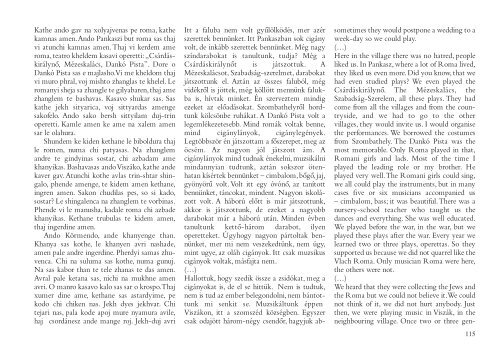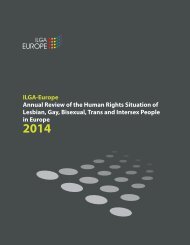You also want an ePaper? Increase the reach of your titles
YUMPU automatically turns print PDFs into web optimized ePapers that Google loves.
Kathe ando gav na xolyajvenas pe roma, kathe<br />
kamnas amen. Ando Pankaszi but roma sas thaj<br />
vi atunchi kamnas amen. Thaj vi kerdem ame<br />
roma, teatro kheldem kasavi operetti: „Csár dás -<br />
királynô, Mézeskalács, Dankó Pista”. Dore o<br />
Dankó Pis ta sas e majlasho. Vi me kheldom thaj<br />
vi muro phral, voj mishto zhanglas te khe lel. Le<br />
roma nyi sheja sa zhangle te gilya baren, thaj ame<br />
zhang lem te bashavas. Kasavo shukar sas. Sas<br />
kathe jekh sityarica, voj sittyardas amen ge<br />
sako felo. Ando sako bersh sittyilam duj-trin<br />
operetti. Kamle amen ke ame na xalem amen<br />
sar le olahura.<br />
Shundem ke kiden kethane le biboldura thaj<br />
le romen, numa chi patyasas. Na zhanglem<br />
andre te gindyinas sostar, chi azbadam ame<br />
kha nyikas. Bashavasas ando Viszáko, kathe an de<br />
kaver gav. Atunchi kothe avlas trin-shtar shingalo,<br />
phende amenge, te kidem amen ke tha ne,<br />
ingren amen. Sakon chudilas pes, so si kado,<br />
sostar? Le shingalenca na zhanglem te vorbinas.<br />
Phende vi le manusha, kadale roma chi azbade<br />
khanyikas. Kethane trubulas te ki dem amen,<br />
thaj ingerdine amen.<br />
Ando Körmendo, ande khanyenge than.<br />
Khanya sas kothe, le khanyen avri nashade,<br />
amen pale andre ingerdine. Pherdyi samas zhuvenca.<br />
Chi na suluma sas kothe, numa gunuj.<br />
Na sas kabor than te tele zhanas te das amen.<br />
Avral pale ketana sas, nichi na mukhne amen<br />
avri. O manro kasavo kalo sas sar o krospo. Thaj<br />
xumer dine ame, kethane sas astardyime, pe<br />
kodo chi chiken nas. Jekh dyes jekhvar. Chi<br />
tejari nas, pala kode apoj mure nyamura avile,<br />
haj csordánesz ande mange roj. Jekh-duj avri<br />
Itt a faluba nem volt gyûlölködés, mer azér<br />
szerettek bennünket. Itt Pankaszban sok cigány<br />
volt, de inkább szerettek bennünket. Még nagy<br />
színdarabokat is tanultunk, tudja? Még a<br />
Csárdáskirálynôt is játszottuk. A<br />
Mézeskalácsot, Szabadság-szerelmet, darabokat<br />
játszottunk el. Aztán az összes faluból, még<br />
vidékrôl is jöttek, még köllött mennünk falukba<br />
is, hívtak minket. Én szerveztem mindig<br />
ezeket az elôadásokat. Szombathelyrôl hordtunk<br />
kölcsönbe ru hákat. A Dankó Pista volt a<br />
legemlékezetesebb. Mind romák voltak benne,<br />
mind cigánylányok, cigánylegények.<br />
Legtöbbször én játszottam a fôszerepet, meg az<br />
öcsém. Az nagyon jól játszott ám. A<br />
cigánylányok mind tudnak énekelni, muzsikálni<br />
mindannyian tudtunk, aztán sok szor ötenhatan<br />
kísértek bennünket – cimbalom, bôgô, jaj,<br />
gyönyörû volt. Volt itt egy óvónô, az tanított<br />
bennünket, táncokat, mindent. Nagyon iskolázott<br />
volt. A háború elôtt is már játszottunk,<br />
akkor is játszottunk, de ezeket a nagyobb<br />
darabokat már a háború után. Minden évben<br />
tanultunk kettô-három darabot, ilyen<br />
operetteket. Úgyhogy nagyon pártoltak ben -<br />
nünket, mer mi nem veszekedtünk, nem úgy,<br />
mint ugye, az oláh cigányok. Itt csak mu zsikus<br />
cigányok voltak, másfajta nem.<br />
(…)<br />
Hallottuk, hogy szedik össze a zsidókat, meg a<br />
cigányokat is, de el se hittük. Nem is tudtuk,<br />
nem is tud az ember belegondolni, nem bántottunk<br />
mi senkit se. Muzsikáltunk éppen<br />
Viszákon, itt a szomszéd községben. Egyszer<br />
csak odajött három-négy csendôr, hagyjuk ab -<br />
sometimes they would postpone a wedding to a<br />
week-day so we could play.<br />
(…)<br />
Here in the village there was no hatred, people<br />
liked us. In Pankasz, where a lot of Roma lived,<br />
they liked us even more. Did you know, that we<br />
had even studied plays? We even played the<br />
Csárdáskirálynô. The Mézeskalács, the<br />
Szabadság-Szerelem, all these plays. They had<br />
come from all the villages and from the countryside,<br />
and we had to go to the other<br />
villages, they would invite us. I would organise<br />
the performances. We borrowed the costumes<br />
from Szombathely. The Dankó Pista was the<br />
most memorable. Only Roma played in that,<br />
Romani girls and lads. Most of the time I<br />
played the leading role or my brother. He<br />
played very well. The Romani girls could sing,<br />
we all could play the instruments, but in many<br />
cases five or six musicians accompanied us<br />
– cimbalom, bass; it was beautiful. There was a<br />
nursery-school teacher who taught us the<br />
dances and everything. She was well educated.<br />
We played before the war, in the war, but we<br />
played these plays after the war. Every year we<br />
learned two or three plays, operettas. So they<br />
supported us because we did not quarrel like the<br />
Vlach Roma. Only musician Roma were here,<br />
the others were not.<br />
(…)<br />
We heard that they were collecting the Jews and<br />
the Roma but we could not believe it. We could<br />
not think of it, we did not hurt anybody. Just<br />
then, we were playing music in Viszák, in the<br />
neighbouring village. Once two or three gen-<br />
115



